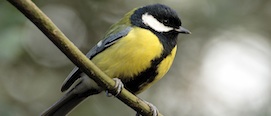2012 Press Releases
UCC research into clever birds

It is generally known that humans vary in their cognitive abilities but it may come as a surprise to learn that the same is true of probably all creatures, even the humble fruit fly Drosophila.
Published in the journal Current Biology, the work shows the clearest test yet of the idea that natural selection should favour the smartest animals. The research was carried out over four years by researchers at Oxford University, including Dr John Quinn based at the School of Biological, Earth and Environmental Sciences at UCC. “It’s been known for many years that relatively ‘clever’ species tend to be adapted to living in more challenging environments than their less intelligent counterparts. But we wanted to explore why we get variation in cognitive ability between individuals of the same species”, explains Dr Quinn.
The researchers caught wild great tits in Wytham Wood near Oxford, famous for its long-term studies on birds, and presented them with simple problems to solve in captivity over 24 hours. To get the food reward - in this case a juicy waxmoth larva - the birds had to remove a lever supporting a platform on which the food was placed in a perspex tube. However only about 40% of the birds were able to solve the problem.
It is well known that cognitive ability in general is partly determined by genes and partly by environmental effects, the so-called nature-nurture dichotomy. But Dr Quinn and his colleagues, Dr Ella Cole of Oxford University and Dr Julie Morand-Ferron (now at the University of Ottawa), then wanted to know how this difference affected the birds’ ability to live in the wild.
Read more about Dr Quinn’s research in The Irish Times: http://tinyurl.com/c6d6tyz
